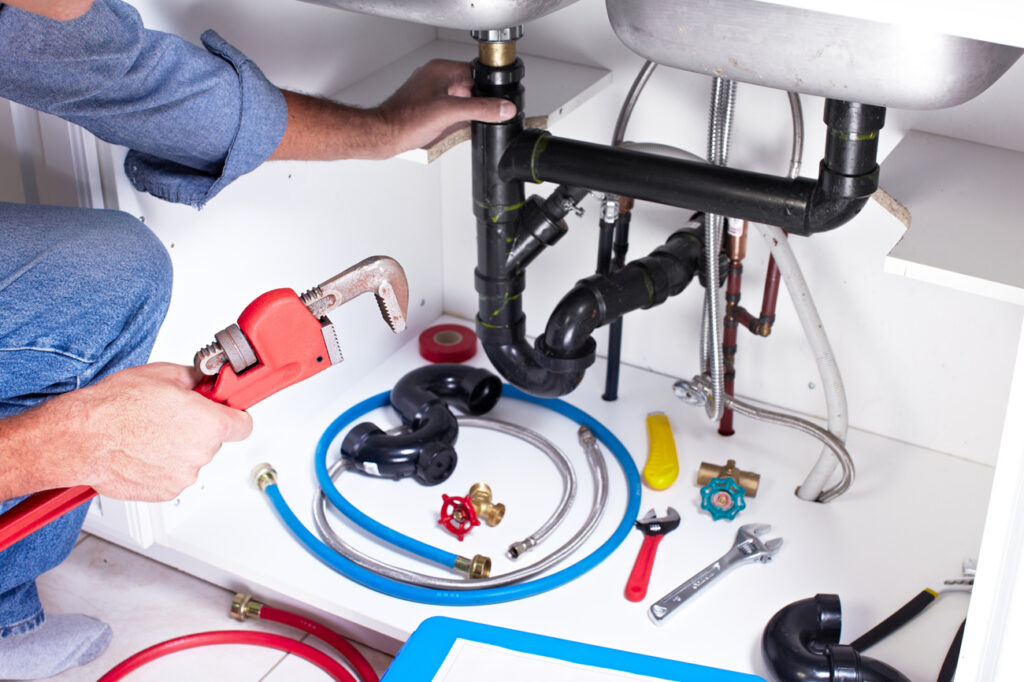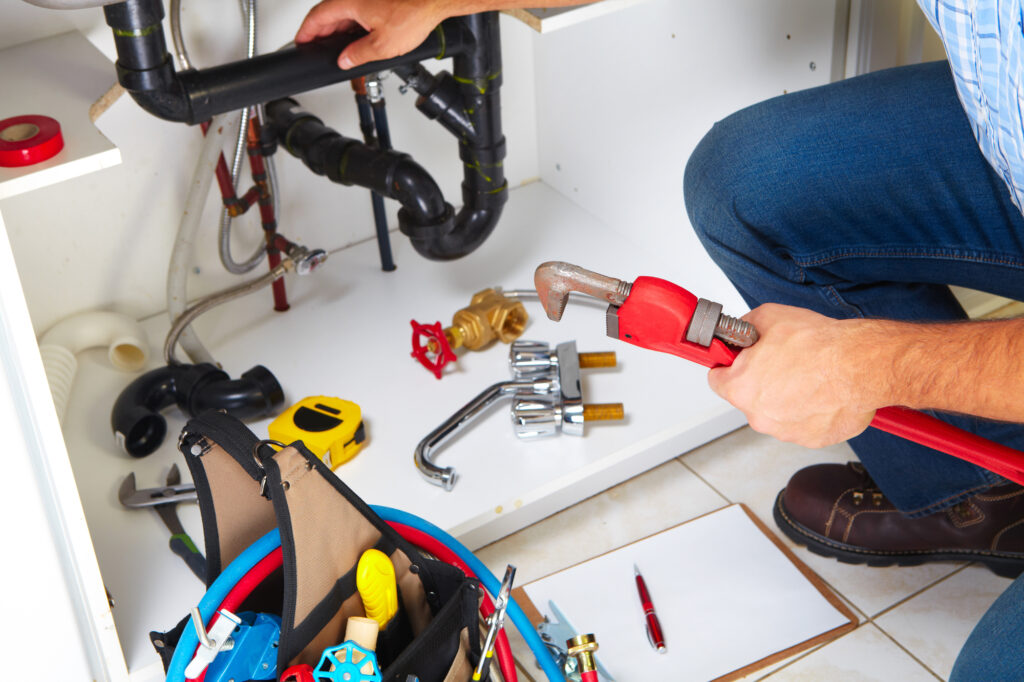Welcome to our guide on plumbing emergencies. Whether you’re a homeowner or a renter, knowing what constitutes a plumbing emergency is crucial for safeguarding your property and your money. From burst pipes to overflowing toilets, if plumbing problems are not resolved quickly, they can cause damage. In this blog, we’ll look deeper into the scenarios that qualify as plumbing emergencies and provide detailed insights on how to handle them effectively.

Understanding Plumbing Emergencies
Plumbing emergencies can vary in severity, but they all share one common feature: the potential for significant damage if left unattended. Let’s break down some common scenarios that typically qualify as plumbing emergencies
-
- Burst Pipes: Burst pipes can cause water damage in minutes, leading to costly repairs and health risks. They often occur due to freezing temperatures, excessive water pressure, or old pipes. It’s crucial to shut off the main water supply immediately and call a plumber to repair the burst pipe to prevent further damage.
- Gas Leaks: Gas leaks are dangerous emergencies that require immediate attention to prevent fire threats and health risks. They can result from damaged gas lines, faulty appliances, or improper installation. If you smell gas or see a leak, evacuate the premises, call your gas provider, and seek professional assistance quickly.
- Sewage Backups: Sewage backups are unsanitary emergencies that can pose serious health risks and cause extensive property damage. They occur when sewage cannot flow properly through the plumbing system, leading to backups in sinks, toilets, or showers. It’s essential to address sewage backups swiftly to prevent contamination and reduce damage.
- No Hot Water: A lack of hot water can be caused by underlying issues with the water heater or plumbing system that can disrupt daily routines. It could occur due to several reasons such as a damaged water heater, sediment accumulation, or a malfunctioning thermostat. Calling a plumber to diagnose and fix the problem is essential for restoring hot water and preventing further inconvenience.
- Overflowing Toilets: An overflowing toilet is a common plumbing emergency caused by clogs, sewer line issues, or the toilet mechanisms not functioning properly. It can lead to water damage, unsanitary conditions, and inconvenience for residents. Immediately shutting off the water supply to the toilet and calling a plumber for assistance can help resolve the issue and prevent further damage.
- Blocked Drains: Blocked drains can cause water backups, foul odors, and damage to plumbing fixtures and pipes. They often result from waste buildup or grease accumulation. Attempting to clear blocked drains without professional assistance can worsen the situation. It is essential to call a plumber to address blockages and restore proper drainage.
- Water Heater Malfunctions: Water heater malfunctions can result in deficient hot water, unusual noises, or leaks. They may arise from issues such as waste buildup, a defective thermostat, or a malfunctioning heating element. Don’t ignore water heater problems because they can cause more damage and higher energy bills. It’s important to have a plumber inspect and repair your water heater to restore hot water and ensure proper function.
- Leaking or Dripping Faucets: If you notice water leaking or dripping from your faucet, it could be a sign of worn-out washers, seals, or O-rings. This not only wastes water but also indicates that your faucet needs repair. Repairing leaking faucets quickly can prevent further damage and save water.
- Frozen Pipes: Frozen pipes commonly burst in cold weather and cause water damage. When water in pipes freezes and expands, it puts pressure on the pipe walls and causes them to burst. It is important to seek professional assistance from a plumber experienced in winterizing plumbing systems to safely soften frozen pipes and prevent future freezing.
- Broken Water Lines: Broken water lines can result from digging, tree root intrusion, or corrosion. They can cause water leaks, low water pressure, and property damage. It is crucial to act quickly in detecting and repairing broken water lines to prevent further damage and restore water service. To locate and fix the broken section of the water line, it is necessary to call a plumber with experience in water line repairs.
- Sudden Decrease in Water Pressure: A sudden decrease in water pressure can indicate issues such as leaks, clogs, or pipe damage in the plumbing system. It can disrupt daily activities and indicate underlying plumbing problems that require professional attention. It is crucial to call a plumber to diagnose and address the cause of low water pressure to restore proper water flow and prevent future issues.
- Strange Sounds Coming from Pipes: Unusual sounds coming from the pipes, like gurgling, hissing, or banging, can be signs of leaks, air in the pipes, or water damaging problems. Ignoring strange sounds can lead to further damage and costly repairs.
Steps to Take During a Plumbing Emergency
In the situation of a plumbing emergency, it’s essential to stay calm and take quick action to minimize damage. Here’s what you should do
- Shut Off the Water Supply: Locate the main water shut-off valve in your home or business and turn it off to stop the flow of water. This will help prevent further flooding and water damage while you wait for professional help to arrive.
- Call a 24/7 Emergency Plumber: Contact a reputable 24/7 emergency plumber as soon as possible. Make sure to choose a plumber who offers round-the-clock service to ensure immediate assistance. Provide them with as much information as possible about the nature of the emergency to help them prioritize their response.
- Reduce Damage: While you wait for the plumber to arrive, take steps to minimize the damage to your property. This may include placing buckets under leaks, cleaning up standing water, and moving valuable belongings to higher ground to prevent water damage.
- Follow Safety Precautions: If the plumbing emergency involves gas leaks or sewage backups, prioritize safety above all else. Evacuate the premises if necessary and wait for qualified professionals to handle the situation. Do not attempt to fix the problem yourself, as this could put your safety at risk.

Trends in Plumbing Emergencies
Recent studies have insight into the emerging trends in plumbing emergencies, highlighting the importance of proactive maintenance and rapid response. Here are some key findings
- Increase in DIY Mishaps: With the accessibility of online tutorials and the desire to save money, more homeowners are attempting DIY plumbing repairs. However, research shows that these DIY efforts often lead to mishaps and worsen plumbing emergencies. Common mistakes include improper installations, improper repairs, and failure to identify underlying issues.
- Impact of Climate Change: Climate change is having a significant impact on plumbing systems worldwide, with extreme weather events becoming more frequent and severe. Studies indicate a rise in incidents such as burst pipes, sewer backups, and flooding, especially in areas that are exposed to intense rainfall or extremely cold temperatures. As a result, homeowners and businesses must take proactive measures to weatherize their plumbing systems and reduce the risk of water damage.
- Importance of Preventive Maintenance: Research emphasizes the importance of preventive maintenance in preventing plumbing emergencies. Regular inspections, maintenance, and repairs can help identify potential issues before they escalate into emergencies, saving homeowners time, money, and stress in the long run. Studies show that proactive maintenance significantly reduces the likelihood of costly repairs and property damage, making it a worthwhile investment for homeowners and property managers.
Conclusion
Understanding what constitutes a plumbing emergency is essential for protecting your home, your belongings, and your family. Whether it’s a burst pipe, a sewer backup, or a blocked drain, knowing how to recognize the signs and take quick action can make all the difference. Remember to stay calm, shut off the water supply, and call a 24/7 emergency plumber for assistance. By being prepared and proactive, you can minimize damage and ensure a speedy solution to any plumbing emergency that arises. Don’t wait until it’s too late – take action today to safeguard your property and your peace of mind.
FAQs
What Should I Do if I Have a Burst Pipe?
If you have a burst pipe, the first step is to immediately turn off the main water supply to prevent further flooding. Then, call a 24/7 emergency plumber for quick repairs.
How Can I Prevent Frozen Pipes During Winter?
To prevent frozen pipes during winter, insulate exposed pipes with foam sleeves or heating tape. To prevent pipes from freezing, it’s advisable to keep the cabinets under sinks open so that warm air can circulate them.
What Should I Do if I Smell Gas in My Home?
If you smell gas in your home, evacuate the premises immediately and avoid using any electrical devices or open flames. Immediately call your gas provider and emergency services to report the leak and wait for further instructions.
Is a Leaking Faucet Considered a Plumbing Emergency?
While a leaking faucet may not pose an immediate threat, it should still be addressed quickly to prevent water waste and potential damage to fixtures. Consider calling a plumber to repair the leak as soon as possible.
How Can I Prevent Sewage Backups in My Home?
To prevent sewage backups, avoid flushing anything other than human waste and toilet paper down toilets. Dispose of grease, oil, and food scraps properly instead of pouring them down drains. Regularly schedule professional drain cleanings to prevent blockages.

